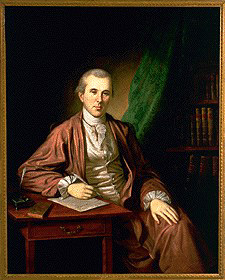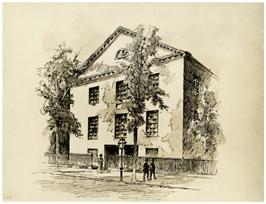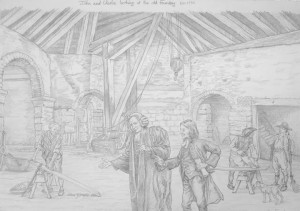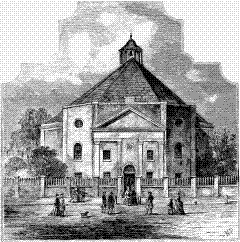
Dr. Benjamin Rush
Painting by
Charles Wilson Peale
1783
Dr. Benjamin Rush was a lifelong friend of Francis Asbury in America. One of the fifty-six signers of the Declaration of Independence where his signature falls between Robert Morris and Benjamin Franklin, Dr. Benjamin Rush is considered the founder of American medicine. The recognition Dr. Benjamin Rush received from leaders of the day ranked him alongside George Washington, John Adams, Benjamin Franklin and Thomas Jefferson. This reverence for Dr. Benjamin Rush is due to his numerous accomplishments.
What were those accomplishments?
Dr. Benjamin Rush gave nearly 40 years political service to his country. His efforts led to the establishment of five universities. Dr. Benjamin Rush was a visionary for school education. His defense of the use of the Bible in public schools is legendary. Dr. Benjamin Rush penned several tracts that were made part of the book, A Defence of the Use of the Bible in Schools in 1830. He also wrote the first American Chemistry textbook as well as several other textbooks used in his colleges, universities and academies.
Dr. Benjamin Rush was a leading individual in the efforts to educate women and blacks. Long before William Wilberforce, Dr. Benjamin Rush and his work among the Africans in the American colonies led him to establish a society to end slavery.

St. Georges
Methodist Church
Philadelphia
When did Dr. Benjamin Rush first meet Francis Asbury? Many believe when Francis Asbury was in America. Francis Asbury arrived to Philadelphia on October 27, 1771. He preached from St. George’s Church in Philadelphia. Did Francis Asbury first meet Dr. Benjamin Rush in Philadelphia? It is likely he didn’t. In fact, it is likely that Francis Asbury first met Dr. Benjamin Rush in London, England.
From the years, 1766 to 1768, Dr. Benjamin Rush studied medicine at the university in Edinburgh, Scotland. At the completion of his studies, he was personally escorted to London, traveling in the carriage of Mr. and Mrs. George Whitefield. In London, Dr. Benjamin Rush traveled to England’s capital city to pursue additional medical studies under Sir John Pringle. Sir John Pringle was the Royal Court Physician.
At the same time of his visit to London, Dr. Benjamin Rush was able to meet with Benjamin Franklin. Franklin was staying in London as well.
It is during this time in 1768 when Francis Asbury was instructed to wait in London for his upcoming preaching assignment. The 1768 Wesleyan Conference which was held in Bristol brought both good and bad news to Francis Asbury. The good news, he was accepted as a full-fledged traveling preacher for the Wesleyan movement. The bad news, he was assigned to the most dangerous preaching circuit in England. John Wesley assigned Francis Asbury to the coastal circuit of Colchester, an area notorious for illegal smuggling from the North Sea.
However, before this treacherous assignment, Francis Asbury spent several months in London. A regular attendee of George Whitefield’s Tabernacle as well as John Wesley’s Foundry Church in London, Francis Asbury easily could have met Dr. Benjamin Rush. The two were the same age of twenty-three. The two were drawn to the gospel-rich movement founded by John Wesley and George Whitefield.
In Black Country, I choose to arrange this meeting between Francis Asbury and Dr. Benjamin Rush. When Francis Asbury meets the well-dressed young man, Dr. Benjamin Rush has just earned his medical degree from the University of Edinburgh in Scotland. Dr Benjamin Rush recounts to Francis Asbury his education at Princeton where he pursued theology, law and medicine. Dr. Benjamin Rush could have chosen any of the three to pursue. A day of fasting and prayer directed the young man to choose medicine. In London, his studies under Sir John Pringle were to give him a mastery of military hygiene. A unique coincidence when you consider that in less than ten years, Dr. Benjamin Rush will become George Washington’s leading physician for his military troops during the American Revolutionary War.

John and Charles looking at the abandoned foundry, later to become the Foundry Wesleyan Church, London Rendering by Richard G. Douglas
The instant friendship between Francis Asbury and Dr. Benjamin Rush leads them not only to worship at two of Methodism’s biggest chapels, the Foundry Church and the Whitefield Tabernacle. Their kindred spirit also leads them to participate in a street outreach among several key women in the Wesleyan movement. These women are the first women preachers allowed to preach by John Wesley. Francis Asbury and Dr. Benjamin Rush help with attending the sick and needy alongside the notable Wesleyan women, Sarah Crosby, Sarah Ryan, Mary Bosanquet, Mary Clark and Ann Tripp.


